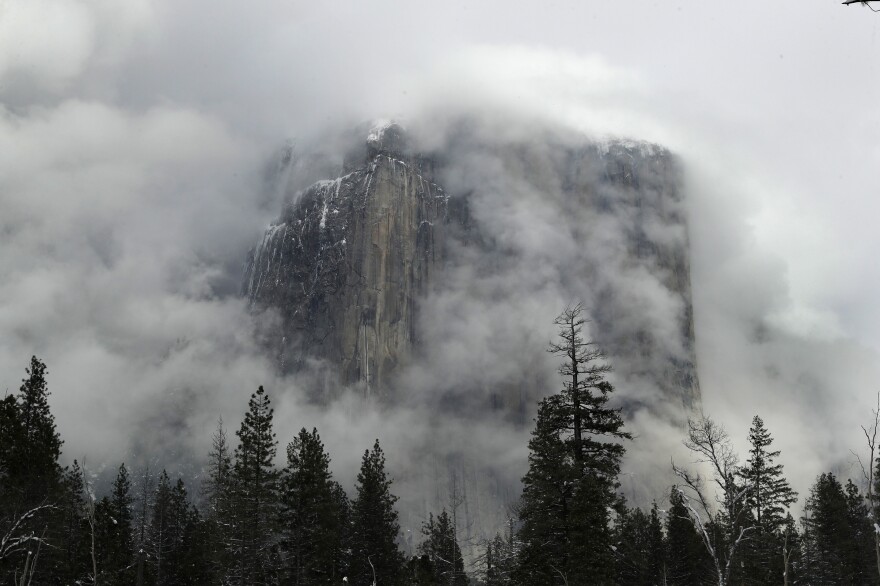California's Yosemite National Park is full of natural wonders. But at a certain time each year, photographers and visitors from all over gather hoping to see something extra special.
Horsetail Fall is a seasonal waterfall that spills off the eastern face of the iconic El Capitan rock formation. For a couple weeks in winter, just before sunset, the light hits in such a way that the water glows gold and yellow, like lava.
They call it the "firefall."
It only lasts a few minutes and conditions have to be perfect, so it's elusive to catch. Even a single stray cloud can block the light and ruin the moment.
"Everything has to fall into line just perfectly in order for it to happen," says Evan Russel, a photographer and the curator at the Ansel Adams Gallery in Yosemite. "And so it's a bit of a gamble as to whether or not it will happen. But when it does, it's a truly magical, spectacular event."
In late February, Russel met up with fine artist James McGrew, and the pair set out to try to capture the firefall before the season ended.
Russel planned to get the moment on camera, while McGrew hoped to get it on canvas. With the phenomenon lasting just a few minutes, speed is key for McGrew.

"When you're chasing light that's moving quickly, you don't have a lot of time," he said. "[There are] only a few minutes where the light is at its most intense firefall-type effect of color. And so it's definitely very high speed painting."
On a clear day recently, Russel and McGrew trekked out in the woods near El Capitan, finding a quiet knoll with the perfect view of Horsetail Fall.
Russel prepared his lenses and McGrew set up his easel. Then, just as the sun neared the horizon, the conditions began to change.
"Those clouds are getting thicker by the moment," Russel said with a sigh. "You know, if there's no sunlight, obviously there's no firefall. So let's just hope for the best, I guess."
The clouds never cleared, and unfortunately, the sun set with no firefall.
"I was getting really excited myself. I thought it was going to be really dramatic with those the clouds hovering around and the sun was going to shoot up from underneath," Russel said. "It teased us pretty, pretty bad."
But capturing the firefall takes persistence and perseverance. So despite their disappointment, Russel and McGrew weren't ready to give up just yet.
So for a second day, the pair set out to the same spot. This time, the skies stayed clear.
As the light from the setting sun hit at just the right angle, the water flowing from Horsetail Fall began to glow. As the wind blew, it kicked up with curtains of luminous yellow and gold hues across the face of El Capitan.
"This is the final few minutes of light," Russel said as he readied his camera. "And here's that shot I've been waiting for."

Meanwhile, McGrew began excitedly painting, mixing streaks of orange and yellow paint down the center of mountain scape on his canvas.
It was mission accomplished. And as night fell, Russel and McGrew made their way back out of the woods, satisfied with their moment in the sun.
Copyright 2024 NPR. To see more, visit https://www.npr.org.

